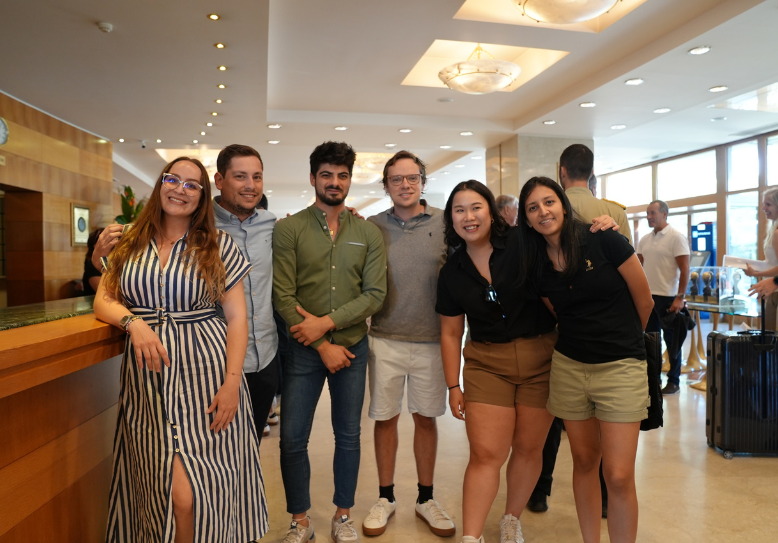Hult’s Global Online MBA: Talking with our inaugural staff cohort
Did you know Hult International Business School’s Global Online MBA started as a staff-only program during the Covid-19 pandemic?
The first staff cohort entered the program in 2021 and members are set to graduate this summer. The group also helped to shape the program by giving continuous feedback to the academic team each semester. We talk to a few of them below on the value of this degree, but first – a review of how far the program has come.
Rise of the Hult Online MBA
Since its launch, Hult’s Global Online MBA has grown into a top ranked program, cited as a leading Online MBA degree by Fortune magazine and QS World University Rankings. Mixing the knowledge and challenge-based teaching approach that Hult is known for, students around the world benefit from an immersive “learn-by-doing” experience that offers ultimate flexibility. In the latest cohort, students from 38 countries joined the growing program.
Hult’s Online MBA has served close to 500 students in its first three years, reaching those who otherwise might not pursue their MBA. This includes working adult learners who have been able to further their education while still working, raising families, and living their lives.
“Our flexibility also creates community and quality interaction with Hult’s faculty—all factors that contribute to program completion,” said Jennifer Serowick, Associate Dean, Online Graduate Programs at Hult. “The overwhelming feedback I get from our students is that the program, with its immediate application to students’ careers and work, is life changing.”
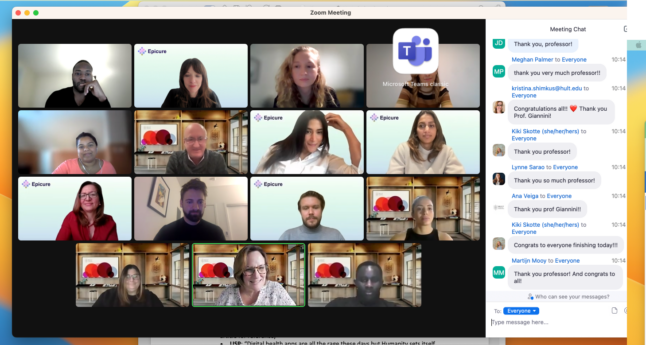

Hult Staff Cohort
Our inaugural cohort actually completed the program in December 2023 and will be part of Hult’s global graduation ceremonies this summer. We sat down with a few of them to learn more about their experiences.
First, tell us your names, where you’re located, and what you do at Hult.
JD: I’m Jennifer Differ, based in Denver, Colorado. I’m Senior Director of Enrollment for Hult’s postgraduate programs in North America.
MF: I’m Marcus Friberg, Vice President of Finance, and am located on Hult’s Boston campus.
PJ: I’m Priya Jain, also a Senior Director of Enrollment, based in Dubai. I manage the team overseeing the South Asia region.
AP: I’m Alice Pandraud, Hult’s Global Registrar. I live and work in London, where Hult has both postgraduate and undergraduate campuses.
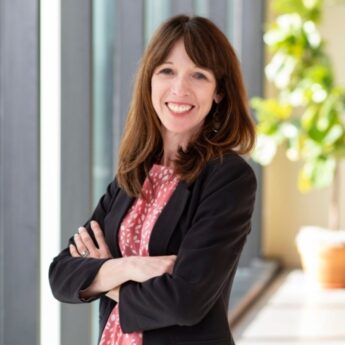

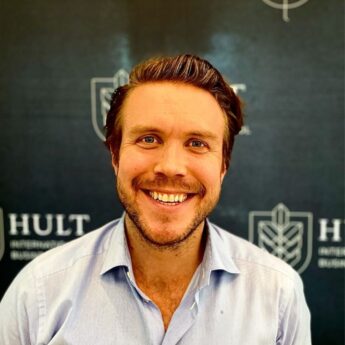



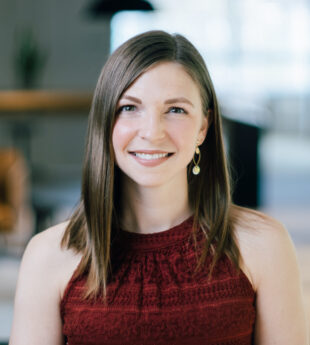

Each of you had different reasons for taking part in the Hult Staff Online MBA program. What were some of those reasons?
JD: For me, it had been quite a while since I finished my undergraduate degree and I felt that it was time to challenge myself in a new way. I’ve worked with Hult since 2009 and prospective students have often asked me if I got my MBA here. I felt it would be nice to ‘walk the talk’ and be able to speak about the program in depth from my own personal experience.
PJ: I completed my Master’s in International Business program at Hult in 2018 and I had a really good experience. It truly was transformational and gave me the skillsets I needed to transition into the education industry and into the business world. So, when the opportunity came up to do the Hult Staff MBA program, it was a no-brainer.
I felt the Global Online MBA program would be a good way to refresh my knowledge and learn new skills and topics necessary in a post-Covid world—like managing teams virtually and getting a better understanding of business analytics and AI. I’d also transitioned to a managerial role since getting my last degree and wanted to learn new managerial skills.
Has the program helped you in your current role? And if so, how?
MF: Yes. Being in the program has broadened my knowledge and understanding of different department and functions within the school, both in terms of having a deeper understanding of the curriculum and, perhaps even more, from the exchanges I’ve had with colleagues throughout the process.
Also, a significant take-away for me was my personal development—specifically, in what I brought away from the different leadership courses. And while that’s a never-ending journey of self-development, I’m confident that I am a better leader today compared to before the program.
AP: Well for one, I’m much more confident! It’s such a valued skill that I’m so proud to have harnessed and reinforced. As a result, I find myself challenging norms and holding my stance in arguments much more when I believe there is a beneficial change we can make. I am also more prepared to hold difficult conversations and persuade others, something that I had found intimidating in the past.
JD: I’ve been in a managerial role for many years, but still I found the authentic leadership courses in the program incredibly helpful. These courses helped me to think about new and better ways that I could motivate and lead my team.
The program also generally gave me more confidence in my decision-making abilities, as well as confidence in my ability to succeed at something even when it feels unknown and daunting at the start. Now when I approach something new at work, I remember what I was able to tackle in the MBA program.
PJ: I’ve been able to implement a lot of what I learned in the Global Online MBA program into my current role. As part of the leadership learning that my peers mentioned, I became more self-aware of my own strengths and areas of development and have been proactive in improving those development areas as much as I can. Some of the other things that I’ve been able to implement include learnings from my Business Insights and AI courses. My role at Hult is strategic in nature and these classes empowered me to use more sophisticated tools to do my data analysis and find “smarter” ways to work.
“A significant take-away for me was my personal development—specifically, in what I brought away from the different leadership courses. And while that’s a never-ending journey of self-development, I’m confident that I am a better leader today compared to before the program.”
— Marcus Friberg, Vice President of Finance, Hult International Business School
The Hult Global Online MBA is a rigorous program. How did you balance full-time work with getting your MBA?
AP: It’s no surprise that self-management is key. Being able to manage your time by carving out opportunities for studying peppered throughout the work week, and on the weekends, is what helped keep me on track. Sometimes, if I really felt the pressure of time, I would block out that time in my personal calendar to hold myself accountable.
Yet, a big part of it is that you’re juggling so many balls in the air: your full-time job, your MBA, your social life, and your hobbies. It was important for me to not let these other pieces suffer as it could have impacted my motivation to carry on with the program, as well as my mental health. As a result, dedicating time for social events was what helped push me forward because I planned them around my study time and used them as a treat; opportunities for fun and to de-stress. You come to savor those moments and really appreciate them.
MF: The program was more time consuming than I anticipated, however most of it was quite flexible, so with a bit of planning ahead it worked out well. The experience improved my time management skills and forced me to be more intentional with what I spend my time on, from balancing school and work to my social life. This resulted in a rewarding feeling of productivity that I strive to retain each day.
Also, the flexibility of being able to attend class from anywhere was very helpful to combine schoolwork with travel and vacation plans. While I definitely preferred the courses that were live classes, the asynchronous classes were great to be able to manage my schoolwork with my professional work. I attended classes from US, UK, Sweden, Switzerland, and Colombia during the program!
JD: I agree with everyone that time management – and staying organized – is key. I have two young kids, so I had to be very strategic about how I allocated my time. Typically, I would study several evenings per week for a couple of hours, and some weekends were busier than others depending on if there was a live class or a final project due. It is absolutely manageable, but I don’t recommend procrastinating! Also, I found that I had more time than I thought I did, as you manage to find extra pockets of time in your day that can be put towards studying.
AP: I’ll also add here that this is where the benefits of virtual learning came in. It provided increased flexibility, enabling you to learn at your preferred pace and allowing you to manage that learning around work and social plans. Moreover, all the Coursera videos had the audio/visual component, but also the written-out script of the video. It was useful to have the flexibility to re-watch, re-read and deep dive at your own pace.
What surprised you most about Hult’s Online MBA program?
PJ: Initially, I had apprehensions about doing a self-paced course. But it turned out to be a much more suitable program for me and for my needs as a full-time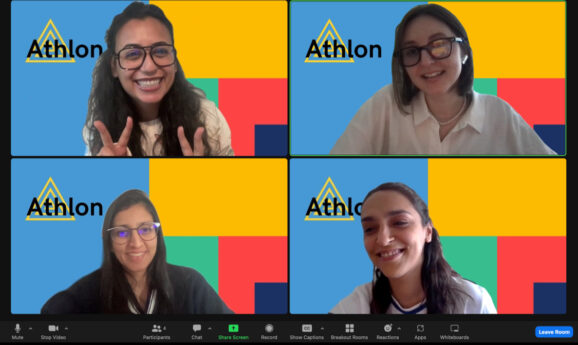

I was also unsure about what it would be like to collaborate with other students in a virtual setting. However, I had a really good experience working with classmates across the globe. In fact, I took many of the learnings from schooling with peers virtually into my own job, where I often work with team members who are working remotely and from different parts of the world.
AP: Prior to the program, I believed that in-person teaching and extended courses were how I learned best. Taking a MBA program as fully online, with some courses being entirely asynchronous and in a condensed format, was something that made me nervous. I worried I wouldn’t learn as deeply or establish connections with my fellow colleagues and thought perhaps I might get tired of the video content.
But as the program carried on, these were the aspects that surprised me the most. I found the asynchronous courses liberating because I could manage my time however I wanted. The live-online courses had opportunities for breakout rooms, making it easier to link up with colleagues and develop our relationships. And knowing the weekend schedules ahead of time facilitated personal planning. So, in fact, the structure of the courses made it easier to manage my time around my work schedule and around my weekend/holiday plan schedule.
MF: I was surprised at how hands-on it was. It’s a completely different way of learning compared to my undergraduate university experience 15 years ago. ‘Learning by doing’ made the program very engaging, and throughout the program I learned parts that I could apply – or at least try out in my day-to-day job – which made the learning experience very engaging!
“I found the asynchronous courses liberating because I could manage my time however I wanted.”
— Alice Pandraud, Global Registrar, Hult International Business School
Hult is known for its challenge-based learning technique. How did the program’s business challenges specifically aid your learning?
JD: I like how each business challenge tied in concepts from earlier courses and gave us the opportunity to practice our new skills. In particular, I remember a Business Challenge that was really interesting in which we had to create a Go-to-Market Strategy in Latin America for a publishing company’s new digital product. The professor brought in executives from that company, as well as other experts within the industry. They weighed in as we prepared our plan and engaged with us during the final presentations. It was incredibly valuable to have that real world viewpoint, and I think it speaks to the great network and connections that Hult professors have, that students then benefit from.
PJ: The business challenges are valuable in that they allow you to apply your learning to real life business scenarios. These challenges gave me a chance to check my understanding and level of mastery in a particular field. It is one thing to know something and another thing to be able to do something, in a practical sense.
For example, one of our Business Challenges was to present a market expansion plan for an Edtech company. This was one of my favorite business challenges because it was organized in a very realistic manner. In the first step, we had a chance to interact with an executive who works at the company. We engaged with them nd asked questions to gain a better understanding of the organization. From there, we went off and did some of our own research, and then were able to present our insights and solutions to yet another set of executives at the company. It was incredibly valuable. Getting real time feedback from the panel at this Edtech firm helped us to think more broadly about strategic planning, and it challenged some of the gaps in our own business knowledge.
MF: The challenges were very engaging, probably my favorite part of the program. Real-world examples and challenges, several times with senior management from the case company, create a setting where you want to perform the best for your team. I learned a lot about myself during those classes through reflection and the feedback sessions.
“[In one business challenge] the professor brought in executives from that company, as well as other experts within the industry … It was incredibly valuable to have that real world viewpoint, and I think it speaks to the great network and connections that Hult professors have, that students then benefit from.”
— Jennifer Differ, Senior Director of Enrollment, Hult International Business School
Finally, would you recommend the program to your colleagues at Hult and to other (non-Hult) learners? Why or why not?
PJ: I would certainly recommend the program to my colleagues and to others. This is a practical program which is highly relevant in today’s market. If done with the right mindset, I believe it will help people become more strategic and become better versions of themselves professionally.
AP: Without a doubt I would recommend this program. I’ve grown through this journey, challenged my weaknesses, gained much feedback to propel myself forward, had fun, and most importantly, do not regret anything. I am proud of myself for achieving this program and wish that to others who are on the cusp of deciding whether to pursue it.
MF: Yes. It’s important to acknowledge that the program is rigorous and is a significant time investment in yourself, and of course it depends on what your future goals are. But I found it incredibly valuable and think the main takeaways are tools and skills that you can apply in almost any role and industry. I’m always curious to learn and am a strong believer in life-long learning and upskilling throughout your career. The program only reinforced these beliefs.
JD: Yes! This was an opportunity for me to get out of my comfort zone in many ways, which is something that we also emphasize to our students. I feel like I grew so much during my time in the program, both professionally and personally. My advice: take the leap and do it!
“This is a practical program which is highly relevant in today’s market … I believe it will help people become more strategic and become better versions of themselves professionally.”
— Priya Jain, Senior Director of Enrollment, Hult International Business School
Thank you everyone for speaking with us!
To learn more about Hult’s Online MBA, visit https://www.hult.edu/mba/online-mba/.


